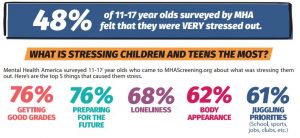It’s back to school time! While it is an exciting time for many, it can also bring additional stress. We often think of stress only for adults, forgetting that teens also get stressed. Sometimes it may seem like it is part of growing up, but there are some who are dealing with stressors that can lead to a serious mental illness such as an eating disorder.
What’s the connection between stress and eating disorders?
Before we look at the connection between stress and eating disorders, it is important to first understand why teens are stressed. In adolescents ages 11-17, the number one cause of stress was getting good grades, followed by preparing for the future. In addition, they also reported that loneliness, body image, and the many priorities they have contributed to their stress.

Even as adults, when we feel overwhelmed or our anxiety increases, we look for ways to cope. This is also true for teens. According to NEDA, just over one-half of teenage girls and nearly one-third of teenage boys use unhealthy weight control behaviors such as restricting, fasting, smoking cigarettes, or vomiting and taking laxatives as with bulimia. The pressure cooker of academics combined with the endless extracurricular activities can make teens feel less in control. Unhealthy behaviors such as binge eating or restricting food, as with anorexia, can sometimes trick them into feeling less stressed and anxious.
Feeling lonely can also severely impact one’s mental health. Turning to food, compulsive exercise or even restricting calories can produce a feeling of numbness, drowning out the loneliness. These temporary feelings of comfort, however, can often lead to increased levels of anxiety and isolation.
Body image also comes into play during these formative years, as many teens gauge their self-worth by their appearance. Poor body image can develop at a young age, in fact over 50% of girls ages 9-10 feel better about themselves if they are dieting, according to the Centers for Disease Control and Prevention. Poor body image is not only a girl issue, but boys in ninth and tenth grade are also using more anabolic steroids to gain more muscle mass.
What symptoms do I look for in my teen?
Teens may not want to discuss their stress or their eating disorder, but some things can be indicators of a serious problem:
Stress (Mental Health America):
- Headaches or other unexplained aches and pains
- More frequent visits to the school nurse
- Getting colds more than usual
- Feeling sad or moody
- Seeming “burned out”
- Sounding defeated when talking about challenges
- Trouble sleeping
- Changes in appetite
- Fighting with family and friends
- Trouble thinking clearly
- Acting nervous or anxious
Eating Disorders (National Eating Disorders Association):
- A distorted body image
- Skipping most meals
- Unusual eating Frequent weighing
- Extreme weight change
- Insomnia
- Constipation
- Skin rash or dry skin
- Dental cavities
- Erosion of tooth enamel
- Loss of hair or nail quality
- Hyperactivity and high interest in exercise
How can I help my teen?
As a parent, you may not be able to alleviate the stress in your child, but there are some things you can do to help. Teach them that trying their best is what is important, and nobody gets it right all the time. Also, help them learn to manage their time, making a schedule and setting small goals can make a difference. Most importantly, no one should suffer in silence and knowing when to ask for help takes great courage. Help your teenager to understand that you are there to support them and are open to finding additional help if needed.
At Toledo Center for Eating Disorders, we understand the difficult role of a parent who has a teenager suffering from an eating disorder. We provide an adolescent program for male and female adolescents (ages 10-17) that utilizes evidence-based modalities in a safe, structured environment. Our dedicated team of professionals emphasize meal planning, symptom reduction/elimination skills, and relapse prevention through participation in individual, group, and family therapy sessions. Within the program clients also are offered training on emotional and social skills, as well as assertiveness, and stress management techniques. In addition, we help our clients continue their education while in treatment by providing tailored educational plans. Our Education Coordinator works with the client’s school to coordinate their studies.
We offer innovative, compassionate care for those suffering from eating disorders such as anorexia, bulimia, and binge eating disorder. Call our admissions team or complete our contact form to begin the process of helping your child find freedom from their eating disorder.

